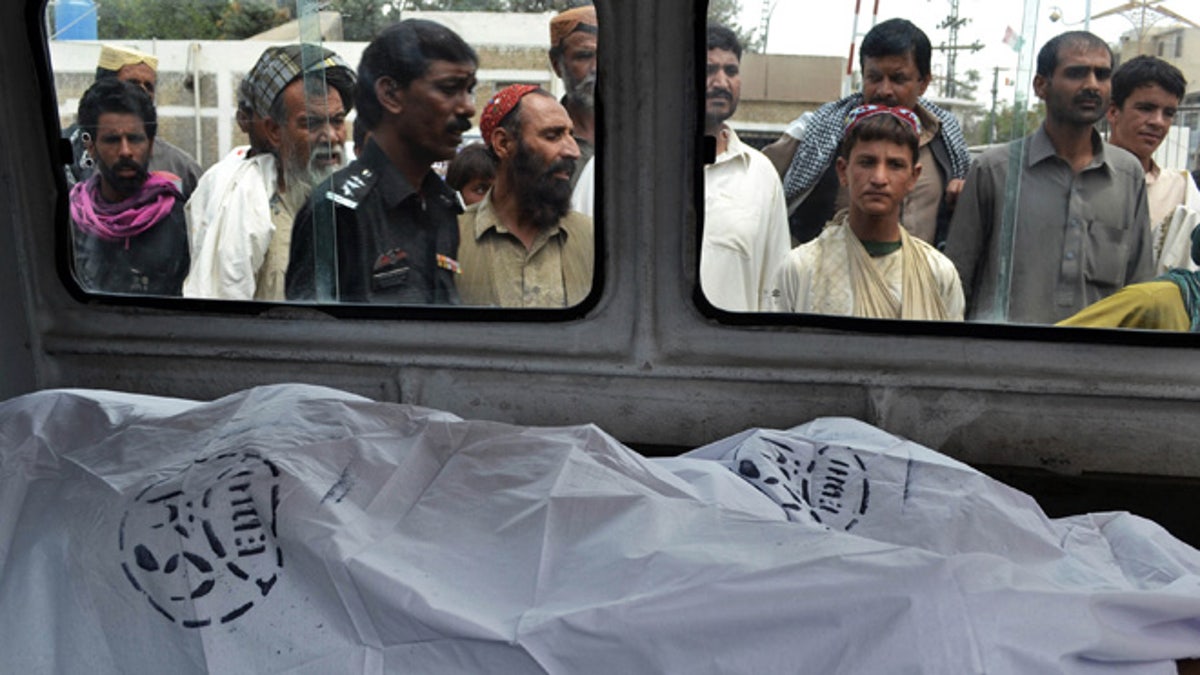
Aug. 6, 2013: People look at the lifeless bodies of victims shot by gunmen at a local hospital in Quetta, Pakistan. (AP)
QUETTA, Pakistan – Dozens of gunmen disguised in police uniforms shot to death 13 people they pulled off of a convoy of buses in southwest Pakistan and dumped their bodies in a nearby ravine, officials said Tuesday.
The motive for the attack Monday night was unclear since no one has claimed responsibility. But suspicion may fall on separatists who have been waging a low-level insurgency in southwest Baluchistan province for decades.
The buses were headed to central Punjab province, and the separatists have a history of attacking Punjabis who they view as outsiders encroaching on their independence. The province is also home to many Islamic militants who have carried out attacks in the past, especially on minority Shiite Muslims.
Paramilitary troops provide protection for bus convoys moving through Baluchistan. But gunmen distracted the troops by shooting at a nearby oil tanker, said Kashif Nabi, a local government administrator.
Meanwhile, dozens of other gunmen dressed in tribal police uniforms stopped the convoy of five buses at a security checkpoint about four miles away after overpowering the nine policemen who were stationed there, said Abdul Waheed, deputy commissioner of Bolan district, where the attack took place.
The attackers surrounded the buses, and two gunmen entered each vehicle to check the identities of passengers, said Waheed. While they were doing this, a paramilitary soldier tried to sneak into the area, but he was killed by the gunmen, said Waheed.
The attackers took 22 passengers with them, including nine tribal policemen, said Waheed. But they dropped the policemen off a few miles away because they were locals, and continued on with the remaining 13 hostages, said Waheed.
Police found the dead bodies of the 13 on Tuesday in a ravine near the town of Machh, around 6 miles from the checkpoint where the buses were stopped, said Nabi, the local administrator who works in Machh.
Elsewhere in Pakistan, Taliban gunmen killed three senior security officials in a northern area of the country, officials said Tuesday. It's the same area where the militant group shot to death 10 foreign mountain climbers over a month ago.
The security officials were ambushed in their vehicle at around 1:30 a.m. on Tuesday morning in Gilgit-Baltistan's Diamer district, said Ajmal Bhatti, the district's deputy commissioner. They were attacked shortly after leaving Bhatti's house, where they had been holding a meeting.
The dead included an army colonel, a captain and the district police chief, said Bhatti. Their vehicle plunged into a ravine after it was attacked, and authorities later recovered the bodies.
Officials have been on high alert in Diamer since Taliban militants killed the 10 foreign climbers in late June at a mountain base camp, said Bhatti. They have been holding meetings at unusual times and places, like Bhatti's house, to avoid attack.
The same faction of the Pakistani Taliban that claimed responsibility for the attack on the mountain climbers, Junudul Hafsa, also claimed responsibility for the latest shooting. A spokesman for the group, Abdullah Ghazi, spoke to The Associated Press by telephone from an undisclosed location, saying it was behind the attack.
A Pakistani security official said the three men who were killed were investigating the attack on the climbers. They were trying to convince locals to confirm some of the details of the attack and identify the militants involved, said the official, speaking on condition of anonymity because he was not authorized to talk to the media.
In the city of Rawalpindi next to Pakistan's capital, Islamabad, former military ruler Pervez Musharraf failed to appear in court Tuesday. His lawyer cited security concerns, according to public prosecutor Mohammad Azhar Chaudhry. Musharraf was expected to be charged in connection with the gun and suicide attack that killed former Prime Minister Benazir Bhutto in 2007, said Chaudhry.
Musharraf, who was president of Pakistan at the time of the attack, has denied involvement in Bhutto's assassination.
One of Musharraf's lawyers, Ilyas Siddiqui, requested that the judge exempt Musharraf from appearing in court because of the threats to his life, said Chaudhry. The judge adjourned the hearing until Aug. 20.
Musharraf returned to Pakistan in March after years in exile to run for parliament, despite Taliban death threats. But he was disqualified from running because of his actions while in power and has spent most of his time under house arrest on the outskirts of Islamabad.
Islamabad has been on high alert in recent days because of intelligence indicating militants may be planning attacks against targets in the city. It's unclear if Musharraf was one of the targets indicated by the intelligence.








































